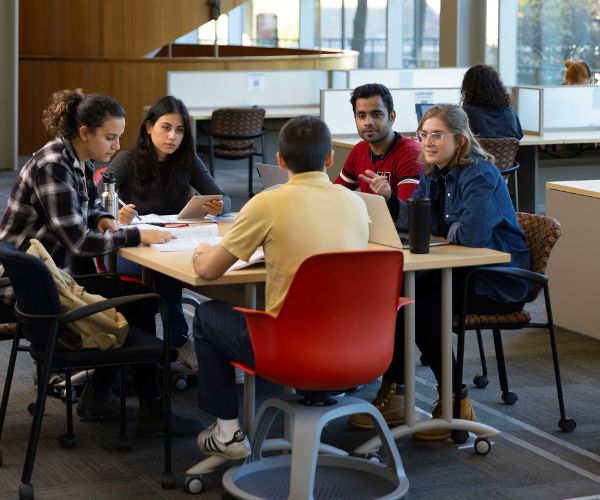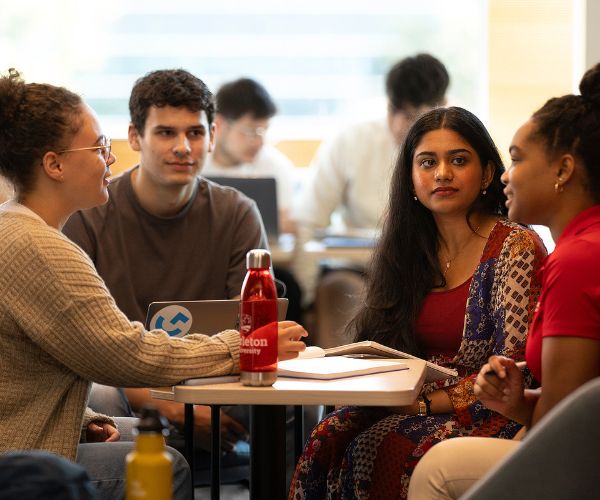Visit Carleton! Book your tour today.
Program Details
Europe and Russia have played and continue to play an important role in shaping the world. Taught by top experts in their fields, students in this interdisciplinary specialization will study the region’s history, society, politics, economics, language, and culture, placing them in a broader global context. The program’s geographic scope is unique in treating Europe, Russia, and Eurasia together, highlighting the considerable social, cultural, economic, and political ties that span the region. You may focus your studies on particular countries, a set of countries, or regional institutions such as the European Union. You may also study thematic issues that affect the region such as migration, transnational civil society, trade, EU enlargement, foreign policy, and the impact of globalization on identity politics.
The specialization is championed by the Institute of European, Russian, and Eurasian Studies, one of Canada’s oldest area studies programs that works closely with Carleton’s Centre for European Studies, a European Union Centre of Excellence.
Language Requirement
The BGInS program features a second-language requirement that can be taken, for example in Arabic, Chinese (Mandarin), French, German, Italian, Japanese, Korean, Portuguese, Russian, Spanish and/or American Sign Language. Students may also take other languages at other institutions of higher education with prior approval.
International Experience Requirement
The BGInS program features an international experience requirement as an integral part of the program. The options for fulfilling this requirement include: studying abroad under one of Carleton’s international exchange agreements, undertaking an international internship, completing a Carleton University course abroad, or taking our international group project course at Carleton.
Work Experience
A Co-op option is available. Co-op is the opportunity to get a head start on a career. Co-op work terms allow for the development of key employability skills, exploration of career options and graduation with tangible, workplace experience.

Get started in Carleton360 to receive tailored information on our programs, student services and community.

Career Outcomes
Explore your passions, refine new skills and discover the career that’s right for you.
The critical skills gained from BGInS will prepare you for a wide variety of careers.
Sample Careers
- Administration
- Advocacy
- Business
- Civil Service
- Conservation
- Consulting
- Diplomacy
- Education
- Finance
- Foreign Service
- Government
- International Development
- International Relations
- Journalism
- Law
- Lobbying
- Media
- Museums and Historical Sites
- Non-Governmental Organizations
- Non-Profit Sector
- Policy Analysis
- Politics
- Polling
- Public Service
- Research
- Teaching
- Tourism

Sample Courses
EURR 1001 - Introduction to European and Russian Studies
An introduction to the study of Europe and Russia, including aspects of the histories, societies, cultures, and politics of the region.
EURR 3002 - Literature and Culture in Russia and Eurasia
A survey of the literature and cultural texts that have defined Russian and neighboring Slavic countries. Examination of fiction and non-fiction texts that have contributed to and reflected the development of Russian and Slavic culture and society.
Visit the Undergraduate Calendar to view a comprehensive list of course offerings for this program and discover the exciting things Carleton students are learning in the classroom!
Global and International Studies allowed me to explore various aspects of global issues while honing my communication skills. I worked on a project with an international NGO based out of Italy that made direct impact to the local communities. My international experience allowed me to engage with various stakeholders from Nairobi, Nigeria, Germany, Italy and many other surrounding regions focusing on advocacy. I worked on communication strategies to raise awareness about providing education for immigrants, refugees and those living in war-torn countries — an opportunity that had opened many doors for me. It was incredibly rewarding to apply the theoretical knowledge gained in my program to real-world issues and make a tangible impact. Being exposed to diverse perspectives and global issues enhanced my cultural competence and adaptability, preparing me for a wide range of future career opportunities in fields such as international relations, journalism or public relations and stakeholder engagement.


